Date and place
- June 21st, 1813 near Vitoria (or Vittoria), sixty-five kilometers southeast of Bilbao, Basque Country, Spain.
Involved forces
- French army (57,000 men) under King of Spain Joseph Bonaparte, and Marshal Jean-Baptiste Jourdan.
- English-Portuguese-Spanish coalition (75,000 men) under General Arthur Wellesley, Marquess of Wellington.
Casualties and losses
- French army: around 8,000 men (6,000 killed or injured, 2,000 prisoners), 140 guns.
- English-Portuguese-Spanish army: 5,000 killed or injured.
General situation
At the beginning of 1813, Napoleon's French armies were already in a dire situation in Spain when he had to take troops from the peninsula following the Russian disaster. King Joseph Bonaparte's formidable challenges were becoming overwhelming.
Wellington, the recently appointed Generalissimo of the Spanish armies, chose this moment to resume the offensive. On May 22, he marched onto Salamanca from Ciudad-Rodrigo , where he had retreated after his failures at the end of 1812. He then crossed the Douro river at Tordesillas and Zamora and advanced on Burgos, threatening the road to Bayonne.
This skilful manoeuvre proved wiser than marching directly on Madrid, forcing Joseph Bonaparte to leave his capital for the last time by overrunning them on the right and threatening their lines. The last wagons, convoyed by General Léopold Hugo, left on May 27.
The King and Marshal Jean-Baptiste Jourdan's intention was to withdraw behind the Ebro river and to keep their position there. However, this plan had to be scrapped when Wellington managed to cross the river by a route that was wrongly considered impassable. The French, now cut off from the atlantic coast, were again threatened to be attacked from the right.
General Honoré Charles Reille , who led the "Armée de Portugal" (french troups in Portugal since 1809), barely avoided this disaster. Joseph had no choice but to retreat his headquarters to Vitoria, which had some 25,000 inhabitants at that time. He decided to fight on the left bank of the Zadorra river, close to the city.
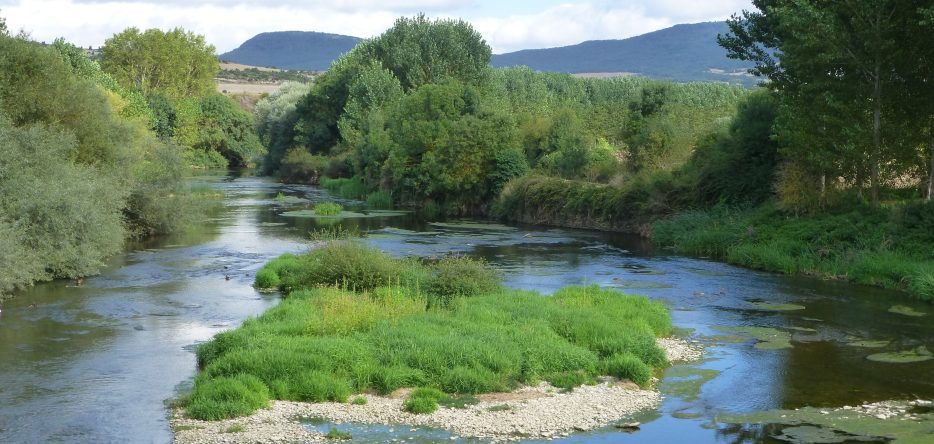
In doing so, Joseph neglected other possible options: withdraw to Zaragoza to rally Marshal Louis-Gabriel Suchet, withdraw immediately to Bayonne and avoid the battle, or accept the battle a little further north, on the heights of Salinas and Mondragon , which were much easier to defend.
It's not clear whether the king was responsible for this decision, or the generals in his circle.
The terrain and the positioning of the armies
The chosen battlefield was a 20 kilometers long by 10 kilometers wide depression surrounded by mountains. The entire length of the main road from Madrid to Bayonne runs through it, along with the rio Zadorra. This river runs north and west of the town, but could be crossed by several bridges that no one took the initiative to destroy or protect.
Another disadvantage for the French was the piles of baggage filling up Vitoria and the surrounding area, blocking the roads and slowing down troop movements. A final convoy left on the night before the battle, reducing the already depleted ranks by a further 4,000 men. However, due to a lack of draft animals, it had to leave the siege artillery behind. All this equipment was stored in a park not far from town, where the Afrancesados, Joseph's Spanish supporters, were also roaming in panic.
Jourdan got a fever on the 20th, and was unable to give the orders needed to regroup an overstretched army. By the 21st, the French position overlapped the road to the west as follows:
- The "Armée du Midi", under General Honoré Gazan , formed the first line, commanding the rio Zadorra valley. It stretched from Puebla , where it had its outposts, to the Ariñiz hills , 8 kilometers west of Vitoria. Its right wing of defense rested on the river at the Villodas bridge [42.83326, -2.78230].
- The "Armée du Centre", under General Jean-Baptiste Drouet d'Erlon , formed a second curtain, one kilometer behind the first. Its left wing was near Gomercha [Gometxa] and its right wing near Margarita .
- The "Armée de Portugal", commanded by General Reille, covered Vitoria. His right wing was to the north, along the Zadorra river, stretching between Aranguis [Aránguiz], on the road to Bilbao, and the road to Pamplona and Bayonne. Two divisions were detached to the west near Armentia , Hermendad [Lermanda] and Margarita, at the foot of the hills.
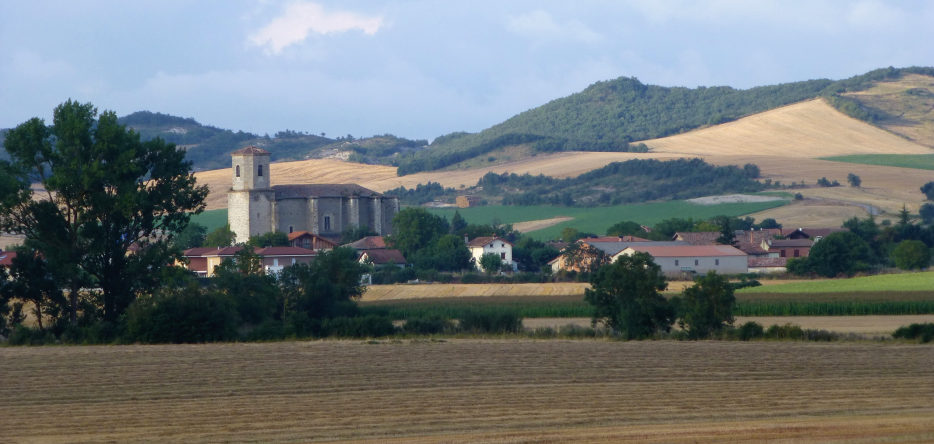
Joseph only had 57,000 troops and 140 cannons, while General Bertrand Clausel 's 14,000 soldiers of the "Armée du Nord" were still in Logroño. Their commander gave up the pursuit of General Espoz y Mina 's insurgents too late, as he had not received clear orders in good time. His forced march back to Vitoria prevented him from arriving in time to take part in the battle.
Meanwhile, General Maximilien Foy (6,000 men in Biscay) and General Antoine Popon de Maucune (who had left to escort a convoy to Irun) were also missing.
Opposite, Wellington had 78,000 men (including 25,000 Spaniards and 10,000 Portuguese) and 108 cannons, which he organized into four columns, commanded from right to left looking south by:
- General Rowland Hill
- Wellington himself
- General George Ramsay, 9th Earl of Dalhousie
- General Thomas Graham .
The fights
The attack began at four in the morning. Hill captured the lightly defended Puebla heights, which he held despite the French's best efforts, who realized their value a little too late. He then crossed the rio Zadorra at Puebla, and took control of Subijana de Álava around 8 a.m.:
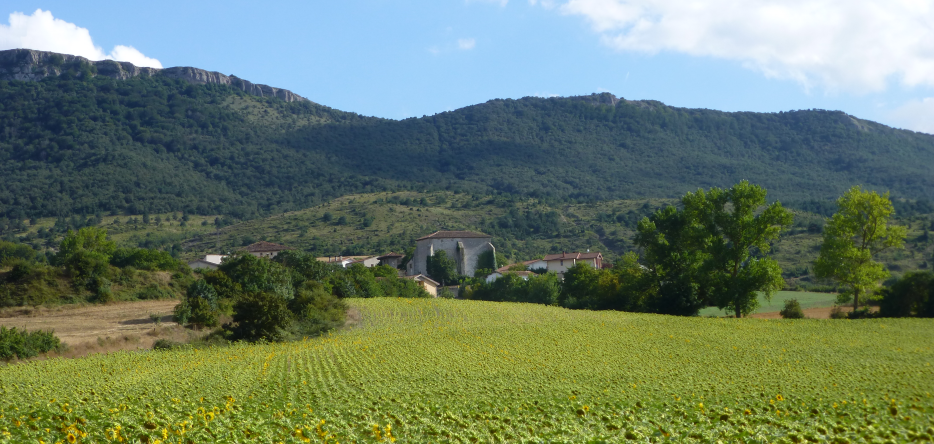
At around 9 a.m., two English divisions of the center-right crossed the rio at the Nanclares and Tres-Puentes bridges, soon followed by the two divisions of the Earl of Dalhousie. These four divisions threatened the French left and center on their right, while General Hill, from Subijana, pushed on their left.
Gazan and d'Erlon, caught in the crossfire, were ordered to withdraw towards Vitoria. They complied, although nothing decisive had yet happened, and their strong artillery delivered painful blows to the enemy. Their retrograde movement continued in good order.
Around midday, the left wing and center of the French position were still holding out, but the right wing was attacked vigorously by General Graham. He moved from Murguia to Vitoria along the Bilbao road, and seized the heights overlooking Gamarra Mayor [42.87672, -2.65779], Gamarra Menor [42.88421, -2.64733] and Abechuco [Abetxuko] [42.87962, -2.68481], which were heavily occupied by Reille's troops.
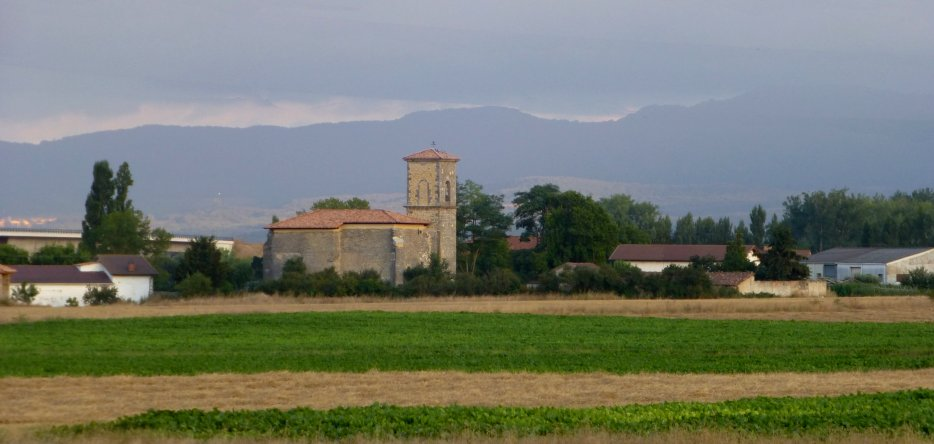
Graham then attacked Gamarra Mayor, which controlled the main French retreat route from Vitoria to Bayonne. The village was taken at around 1 pm by Graham's troops, despite a stubborn defense and relentless efforts to recapture it. The same happened at Abucheco.
The "Armée de Portugal" bravely resisted and then retreated to Betoño , where it positioned itself and stopped the enemy on the left wing for a while.
By 4 p.m., the French left and center retreated all the way to Vitoria. The British army's center then joined up with the right.
Two hours later, the allies were able to break through the French ranks and the defeat of the napoleonic troops was inevitable. The only thing on everyone's mind was to take the road back to France, and the soldiers began to flee among the civilians, leaving behind five to six thousand dead or wounded, two thousand prisoners and most of their guns.
But the only available retreat route was a barely passable road leading east to Pamplona, through Arbulo and Salvatierra-Agurain.
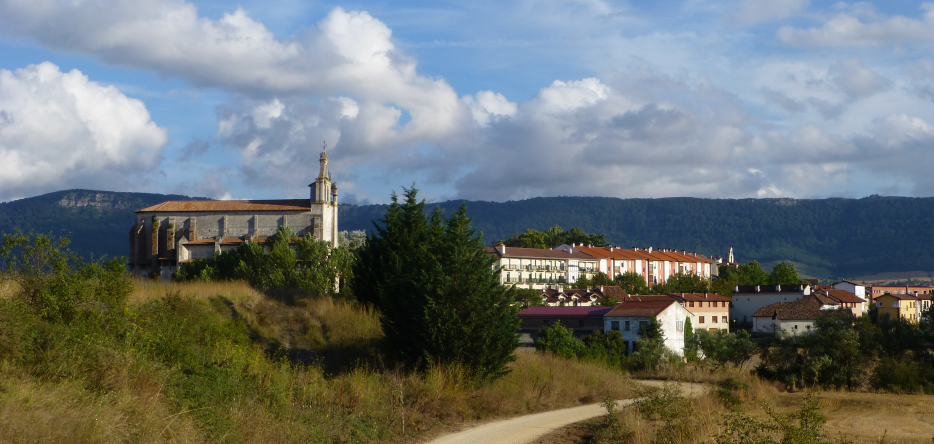
The army was disorganized by the terrain, and burdened with Spanish refugees, women, children and employees of the military authorities.
It marched in complete disorder, with horsemen mixed with infantrymen, and all the regiments merged into a shapeless mass.
Joseph reached Salvatierra-Agurain for the night. Once he crossed the border, he settled in Saint-Pée-sur-Nivelle.
The harvest was miraculous for Wellington's troops: the king's wardrobe, the army's treasure, all the baggage and loot accumulated in the gigantic convoys that never made it to the Empire. They were too busy plundering and neglected their pursuit, missing the opportunity to turn their victory into a triumph.
The aftermath of the battle
After this new defeat, Napoleon removed his brother's command of operations and gave it to Marshal Nicolas Jean-de-Dieu Soult. However, Soult could only retreat. Spain was lost, although the fighting continued until the beginning of 1814, when the battle ended on French soil.
The only thing left for Napoleon I to do was to restore the Spanish crown to Ferdinand VII. The Spanish War of Independence was over.
Map of the battle of Vitoria
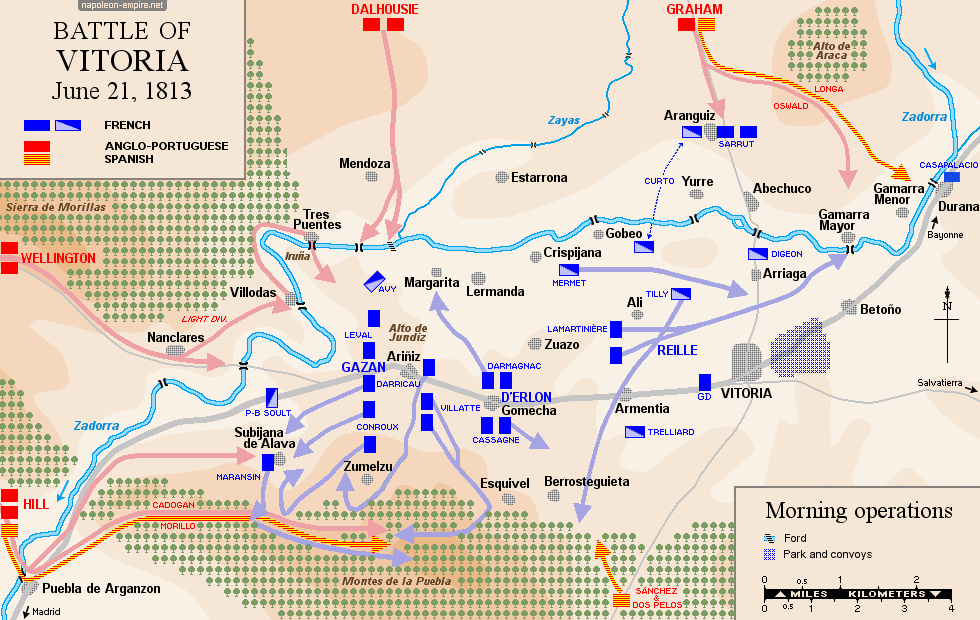
Picture - "Victory of Vittoria". Painted by Charles and Frederick Christian Lewis.
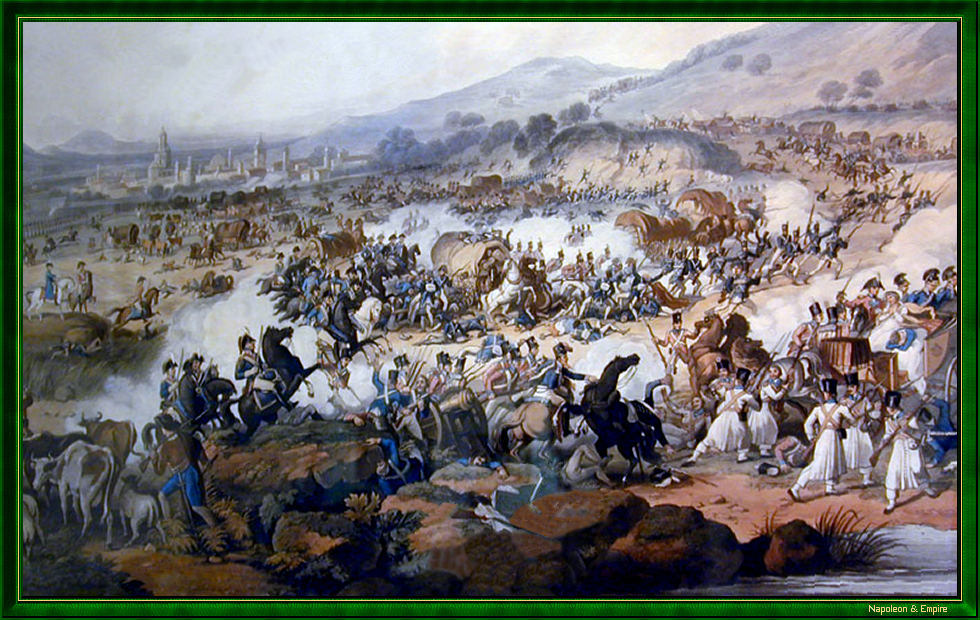
Testimony
Report of General Wellington to the Secretary of State for War and the Colonies, lord Henry Bathurst
To Earl Bathurst.
Salvatierra, 22nd June, 1813.
The enemy, commanded by King Joseph, having Marshal Jourdan as the Major General of the army, took up a position, on the night of the 19th inst., in front of Vitoria; the left of which rested upon the heights which end at La Puebla de Arganzon, and extended from thence across the valley of the Zadorra, in front of the village of Arinez. They occupied with the right of the centre a height which commanded the valley to the Zadorra. The right of their army was stationed near Vitoria, and was destined to defend the passages of the river Zadorra, in the neighbourhood of that city. They had a reserve in rear of their left, at the village of Gomecha. The nature of the country through which the army had passed since it had reached the Ebro, had necessarily extended our columns; and we halted on the 20th, in order to close them up, and moved the left to Munruia, where it was most likely it would be required. I reconnoitred the enemy's position on that day, with a view to the attack to be made on the following morning, if they should still remain in it. We accordingly attacked the enemy yesterday, and I am happy to inform your Lordship, that the Allied army under my command gained a complete victory, having driven them from all their positions; having taken from them 151 pieces of cannon, waggons of ammunition, all their baggage, provisions, cattle, treasure, &c., and a considerable number of prisoners.
The operations of the day commenced by Lieut. General Sir R. Hill obtaining possession of the heights of La Puebla, on which the enemy's left rested, which heights they had not occupied in great strength. He detached for this service one brigade of the Spanish division under General Morillo; the other brigade being employed in keeping the communication between his main body on the high road from Miranda to Vitoria, and the troops detached to the heights. The enemy, however, soon discovered the importance of these heights, and reinforced their troops there to such an extent, that Lieut. General Sir R. Hill was obliged to detach, first, the list regt. and the light infantry battalion of General Walker's brigade, under the command of Lieut. Colonel the Hon. H. Cadogan, and successively other troops to the same point; and the Allies not only gained, but maintained possession of these important heights throughout their operations, notwithstanding all the efforts of the enemy to retake them.
The contest here was, however, very severe, and the loss sustained considerable. General Morillo was wounded, but remained in the field; and I am concerned to have to report that Lieut. Colonel the Hon. H. Cadogan has died of a wound which he received. In him His Majesty has lost an officer of great merit and tried gallantry, who had already acquired the respect and regard of the whole profession, and of whom it might have been expected that, if he had lived, he would have rendered the most important services to his country. Under cover of the possession of these heights, Sir R. Hill successively passed the Zadorra, at La Puebla, and the defile formed by the heights and the river Zadorra, and attacked and gained possession of the village of Subijana de Alava, in front of the enemy's line, which the enemy made repeated attempts to regain.
The difficult nature of the country prevented the communication between our different columns moving to the attack from their stations on the river Bayas at as early an hour as I had expected; and it was late before I knew that the column, composed of the 3rd and 7th divisions, under the command of the Earl of Dalhousie, had arrived at the station appointed for them. The 4th and Light divisions, however, passed the Zadorra immediately after Sir R. Hill had possession of Subijana de Alava; the former at the bridge of Nanclares, and the latter at the bridge of Tres-puentes; and almost as soon as these had crossed, the column under the Earl of Dalhousie arrived at Mendoza; and the 3rd division, under Lieut. General Sir T. Picton, crossed at the bridge higher up, followed by the 7th division, under the Earl of Dalhousie. These 4 divisions, forming the centre of the army, were destined to attack the height on which the right of the enemy's centre was placed, while Lieut. General Sir R. Hill should move forward from Subijana de Alava to attack the left. The enemy, however, having weakened his line to strengthen his detachment on the hills, abandoned his position in the valley as soon as he saw our disposition to attack it, and commenced his retreat in good order towards Vitoria.
Our troops continued to advance in admirable order, notwithstanding the difficulty of the ground. In the mean time, Lieut. General Sir T. Graham, who commanded the left of the army, consisting of the 1st and 5th divisions, and General Pack's and Bradford's brigades of infantry, and General Bock's and Anson's of cavalry, and who had been moved on the 20th to Murguia, moved forward from thence on Vitoria, by the high road from that town to Bilbao. He had, besides, with him the Spanish division under Colonel Longa; and General Giron, who had been detached to the left, under a different view of the state of affairs, and had afterwards been recalled, and had arrived on the 20th at Orduna, marched that morning from thence, so as to be in the field in readiness to support Lieut. General Sir T. Graham, if his support had been required.
The enemy had a division of infantry with some cavalry advanced on the great road from Vitoria to Bilbao, resting their right on some strong heights covering the village of Gamarra Mayor. Both Gamarra and Abechuco were strongly occupied as tiles de pont and the bridges over the Zadorra at these places. Brig. General Pack with his Portuguese brigade, and Colonel Longa with his Spanish division, were directed to turn and gain the heights, supported by Major General Anson's brigade of light dragoons, and the 5th division of infantry under the command of Major General Oswald, who was desired to take the command of all these troops.
Lieut. General Sir T. Graham reports, that in the execution of this service the Portuguese and Spanish troops behaved admirably. The 4th battalion of cacadores, and the 8th cacadores, particularly distinguished themselves. Colonel Longa being on the left, took possession of Gamarra Menor.
As soon as the heights were in our possession, the village of Gamarra Mayor was most gallantly stormed and carried by Major General Robinson's brigade of the 5th division, which advanced in columns of battalions, under a very heavy fire of artillery and musketry, without firing a shot, assisted by 2 guns of Major Lawson's brigade of artillery. The enemy suffered severely, and lost 3 pieces of cannon.
The Lieut. General then proceeded to attack the village of Abechuco with the 1st division, by forming a strong battery against it, consisting of Captain Dubourdieu's brigade, and Captain Ramsay's troop of horse artillery; and under cover of this fire, Colonel Halkett's brigade advanced to the attack of the village, which was carried; the light battalions having charged and taken 3 guns and a howitzer on the bridge. This attack was supported by General Bradford's brigade of Portuguese infantry. During the operation at Abechuco, the enemy made the greatest efforts to repossess themselves of the village of Gamarra Mayor, which were gallantly repulsed by the 5th division, under the command of Major General Oswald. The enemy had, however, on the heights on the left of the Zadorra, 2 divisions of infantry in reserve; and it was impossible to cross by the bridges till the troops which had moved upon the enemy's centre and left had driven them through Vitoria. The whole then co-operated in the pursuit, which was considered by all till after it was dark.
The movement of the troops under Lieut. General Sir T. Graham, and their possession of Gamarra and Abechuco, intercepted the enemy's retreat by the high road to France. They were then obliged to turn to the road towards Pamplona; but they were unable to hold any position for a sufficient length of time to allow their baggage and artillery to be drawn off. The whole, therefore, of the latter which had not already been taken by the troops in their attack of the successive positions taken up by the enemy in their retreat from their first position at Arinez and on the Zadorra, and all their ammunition and baggage, and every thing they had were taken close to Vitoria. I have reason to believe that the enemy carried off with them one gun and one howitzer only.
The army under King Joseph consisted of the whole of the armies of the South, and of the Centre, and of 4 divisions and all the cavalry of the army of Portugal, and some troops of the army of the North. General Foy's division of the army of Portugal was in the neighbourhood of Bilbao; and General Clausel, who commanded the army of the North, was near Logrono with one division of the army of Portugal commanded by General Taupin, and General Van-der-Maessen's division of the army of the North. The 6th division of the allied army under Major General the Hon. E. Pakenham was likewise absent, having been detained at Medina de Pomar for 3 days, to cover the march of our magazines and stores.
I cannot extol too highly the good conduct of all the General Officers, officers, and soldiers of the army in this action. Lieut. General Sir R. Hill speaks highly of the conduct of General Morillo and the Spanish troops under his command, and that of Lieut. General the Hon. W. Stewart, and the Conde de Amarante, who commanded divisions of infantry under his directions. He likewise mentions the conduct of Colonel the Hon. R. W. O'Callaghan, who maintained the village of Subijana de Alava against all the efforts of the enemy to regain possession of it, and that of Lieut. Colonel Rooke of the Adjutant General's department, and Lieut. Colonel the Hon. A. Abercromby of the Quarter Master General's department. It was impossible for the movements of any troops to be conducted with more spirit and regularity than those of their respective divisions, by Lieut. Generals the Earl of Dalhousie, Sir T. Picton, Sir L. Cole, and Major General Baron C. Alten. The troops advanced in echelons of regiments in two, and occasionally 3 lines; and the Portuguese troops in the 3rd and 4th divisions, under the command of Brig. General Power and Colonel Stubbs, led the march with steadiness and gallantry never surpassed on any occasion.
Major General the Hon. C. Colville's brigade of the 3rd division was seriously attacked in its advance by a very superior force well formed, which it drove in, supported by General Inglis' brigade of the 7th division, commanded by Colonel Grant of the 82nd. These officers and the troops under their command distinguished themselves.
Major General Vandeleur's brigade of the Light division was, during the advance upon Vitoria, detached to the support of the 7th division; and Lieut. General the Earl of Dalhousie has reported most favorably of its conduct. Lieut. General Sir T. Graham particularly reports his sense of the assistance he received from Colonel De Lancy, the Deputy Quarter Master General, and from Lieut. Colonel Bouverie, of the Adjutant General's department, and from the officers of his personal staff; and from Lieut. Colonel the Hon. A. Upton, A.Q.M.G., and Major Hope, A.A.G., with the 1st division; and Major General Oswald reports the same of Lieut. Colonel Berkeley of the Adjutant General's department, and Lieut. Colonel Gould of the Quarter Master General's department .
I am particularly indebted to Lieut. General Sir T. Graham, and to Lieut. General Sir R. Hill, for the manner in which they have respectively conducted the service entrusted to them, since the commencement of the operations which have ended in the battle of the 21st; and for their conduct in that battle; as likewise to Marshal Sir W. Beresford, for the friendly advice aud assistance which I have received from him upon all occasions during the late operations.
I must not omit to mention likewise the conduct of General Giron, who commands the Galician army, who made a forced march from Orduna, and was actually on the ground in readiness to support Lieut. General Sir T. Graham.
I have frequently been indebted, and have had occasion to call the attention of your Lordship to the conduct of the Quarter Master General, Sir G. Murray, who in the late operations, and in the battle of the 21st June, has again given the greatest assistance. I am likewise much indebted to Lord Aylmer, the Deputy Adjutant General, and to the officers of the departments of the Adjutant and Quarter Master General respectively; and also to Lord FitzRoy Somerset, and Lieut. Colonel Campbell and those of my personal staff; and to Lieut. Colonel Sir R. Fletcher, and the officers of the Royal Engineers.
Colonel H.S.H. the Hereditary Prince of Orange was in the field as my aide de camp, and conducted himself with his usual gallantry and intelligence.
Mariscal de Campo, Don L. Wimpffen, and the Inspector General, Don T. O'Donoju, and the officers of the staff of the Spanish army have invariably rendered me every assistance in their power in the course of these operations; and I avail myself of this opportunity of expressing my satisfaction with their conduct; as likewise with that of Mariscal de Campo, Don. M. de Alava; and of the Brig. General Don J. O'Lawlor, who have been so long and usefully employed with me.
The artillery was most judiciously placed by Lieut. Colonel Dickson, and was well served; and the army is particularly indebted to that corps. The nature of the ground did not allow of the cavalry being generally engaged; but the General Officers, commanding the several brigades, kept the troops under their command respectively close to the infantry to support them, and they were most active in the pursuit of the enemy after they had been driven through Vitoria.
I send this dispatch by my aide de camp, Captain Fremantle, whom I beg leave to recommend to your Lordship's protection. He will have the honor of laying at the feet of His Royal Highness the colors of the 4th batt. 100th regt., and Marshal Jourdan's baton of a Marshal of France, taken by the 87th regt.
I enclose a return of the killed and wounded in the late operations, and a return of the ordnance, carriages, and ammunition taken from the enemy in the action of the 21st inst.
Arthur Wellesley, Marquess of Wellington
Photos Credits
Photos by Lionel A. Bouchon.Photos by Marie-Albe Grau.
Photos by Floriane Grau.
Photos by Michèle Grau-Ghelardi.
Photos by Didier Grau.
Photos made by people outside the Napoleon & Empire association.